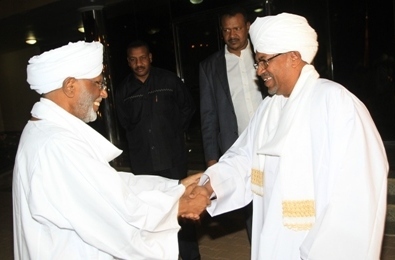Turabi’s party decries international conspiracy against Sudan
September 11, 2015 (KHARTOUM) – The Islamist opposition Popular Congress Party (PCP) reiterated its rejection for international involvement in the national dialogue process and decried an international conspiracy against Sudan.

The party’s leader who also refuses any international participation in the process says the political settlement is the only option to lead the country out of the current political slump and to avoid the collapse of the state in Sudan if the opposition opts for a military confrontation against the regime.
PCP political secretary, Kamal Omer, on Friday praised the stance of the ruling National Congress Party (NCP) and its refusal to accept an inclusive national dialogue preparatory meeting the African Union Peace and Security Council (AUPSC) proposed to hold at the AU’s headquarters to agree on the issues related to the process.
Omer advised the international community and the African Union not to intervene in the national dialogue process, and warned against the breakdown of the state in Sudan saying “the country will face the fate of Syria and Yemen”.
Speaking in a talks show at the official Radio Omdurman on Friday, the PCP representative at the national dialogue committee warned that “There is a great international conspiracy against the Sudan, stressing that the African Union or the European Union cannot dictate their will on the national dialogue”.
In a meeting held in Paris on Wednesday with the international envoys for Sudan, the rebel alliance of Sudanese Revolutionary Front (SRF) called on the UN Security Council to back the AUPSC decision of 25 August providing that Khartoum should accept the pre-dialogue meeting.
The dialogue coordination mechanism announced on 6 September that they can accept the preparatory meeting but only with the rebel groups without the other political and civil society groups as it is initially provided in the African plan.
The 7+7 further emphasized that discussions will only be confined to guarantees that can be offered to them to join the dialogue inside Sudan. By doing so, the dialogue committee refuses to discuss the opposition demands for political freedoms and freedom of the press.
COLLECTIVE RESPONSIBILITY
The Islamist opposition official praised al-Bashir for initiating the process and stressed that he chairs the dialogue not in his quality as head of the ruling party but as a president of the republic. He further added that he is the only “guarantor of the dialogue”.
He added that the NCP does not dictate the decisions related to dialogue process and occupies a space similar and equal to the other political forces in the decision making process within the 7+7 mechanism.
Omer mentioned the existence of progress in the NCP “political discourse and terminology”.
“In addition, we want that its discourse contain hope, reconciliation and acceptance of others,” he said, pointing that the opposition forces are only united in their rejection of the ruling NCP but remain deeply divided.
Turabi’s party strongly opposed to the regime of President Bashir since the famous rift of 1999. and called to topple it. Its leader and supporters were detained several times and accused of plotting against the regime. Also, the PCP was accused of supporting the rebel Justice and Equality Movement (JEM).
However, since the removal of the former vice-president Ali Osman Taha and the former presidential assistant Nafei Ali Nafei in December 2013, Turabi’s aides privately confessed that time has come to shift from their previous position and to support calls for reform and unification among the Sudanese Islamists in order to preserve the common ideal of Islamic state in Sudan.
(ST)
